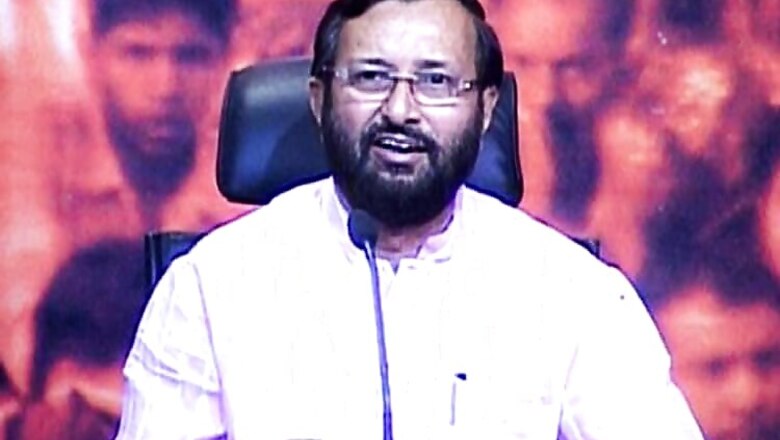
views
New Delhi: Observing that there were many "impediments" in making India clean even after 68 years of independence, Environment Minister Prakash Javadekar on Saturday said his ministry was taking major steps, including amending laws and bringing in new technologies, to achieve the target.
In his message on the occasion of India's 69th Independence Day, the Union Minister said his ministry's mission is "Clean India, Green India".
Referring to Prime Minister Narendra Modi's speech where he talked about people's participation, Javadekar said that 'Jan Bhagidari' is the basic foundation of this government.
In his feature written on a blog started on the PIB website, Javadekar noted that there can be no better combination than that of 'students and trees' and 'youth and nature' which is why his ministry had recently launched a nursery school yojna to bring youth closer to nature and ensure their active participation.
"Even after 68 years of independence, more than 80 per cent of the sewage does not get treated and one-third of the industrial pollution goes into water bodies. There are many impediments in making India clean.
"This year, we have done three things - more sewage treatment plants and new technology, new rules of waste management - solid waste, e-waste, plastic waste, hazardous waste, bio-medical waste and construction waste. All rules have been changed and new technology has been brought in and the base has been widened. These are the real efforts to make India clean," Javadekar said in his message.
Terming Independence Day to be a very important occasion, he said, "Today, we have achieved some part of the dream, but much of it is yet to be redeemed."
"Our mission is Clean India, Green India." He said that some of the other efforts made to make India clean include many river cleaning schemes, more plantation and more afforestation.
He said funds to the tune of USD 9 billion by 14th Finance Commission and USD 6 billion through Compensatory Afforestation Fund Bill will soon be made available.
"We will put USD 15 billion in the next four years for real afforestation of the country, which will definitely increase our green stock, that is the carbon sink we are creating. I think this is an occasion for re-dedication," he added.
Reacting to Modi's speech from the ramparts of Red Fort, Javadekar said, "The confidence that he (Modi) has given that justice will be done to labourers, jawans and farmers is contained in the speech and it mentions all the steps that the government has taken for this during the last 15 months.
"The speech will raise the morale of the nation and one that will inspire the nation to work harder," Javadekar said.
"In the beginning of the address itself, the PM has talked of 'Jan Bhagidari' (peoples' participation) and this Jan Bhagidari is the basic foundation of this government. He has given the resolve to work through peoples' participation.
This, I feel is the essence of PM's I-Day address," he said. Talking about the 'Nursery School Yojana' in his feature, Javadekar said that the initiative is to bring students closer to nature, by involving them in planting and raising saplings in nurseries created in schools.
Under the scheme, students from Class VI to IX will sow the seeds, grow saplings in the school nursery, as part of practical exercise for Biology classes and extra-curricular activities for students of other streams.
At the end of each academic session, the students will carry the grown sapling, along with their academic report cards as a trophy to their home and plant these grown saplings in or around their home and neighbourhood, he said.
He noted that the yojana has been launched in 1,000 schools this year, he said adding that every school must earmark space to prepare a small nursery where the saplings could be planted.
Each school will get an initial first-time financial grant of Rs. 25,000 for the creation of nursery with essential facilities, Javadekar said.
He said that in an effort to impart a strong message against the use of plastic carry-bags (below 40 microns), two schemes on a pilot basis involving school children were conducted in Shirur and Ratnagairi districts of Maharashtra and each programme was attended by more than 6,000 children.
"Similar programmes will be replicated in other cities with a population of more than one lakh in the months to come," he said.
The Ministry has also proposed an urban forestry scheme namely 'Nagar Van Udyan Yojana' on pilot basis which aims to develop at least one city forest initially on forest land ranging from 20 ha to 100 ha in cities having municipal corporations, he said.
"The Ministry will provide one-time financial support for development of the city forests and the scheme aims to create 200 city forests in the country in the next five years," he added.



















Comments
0 comment